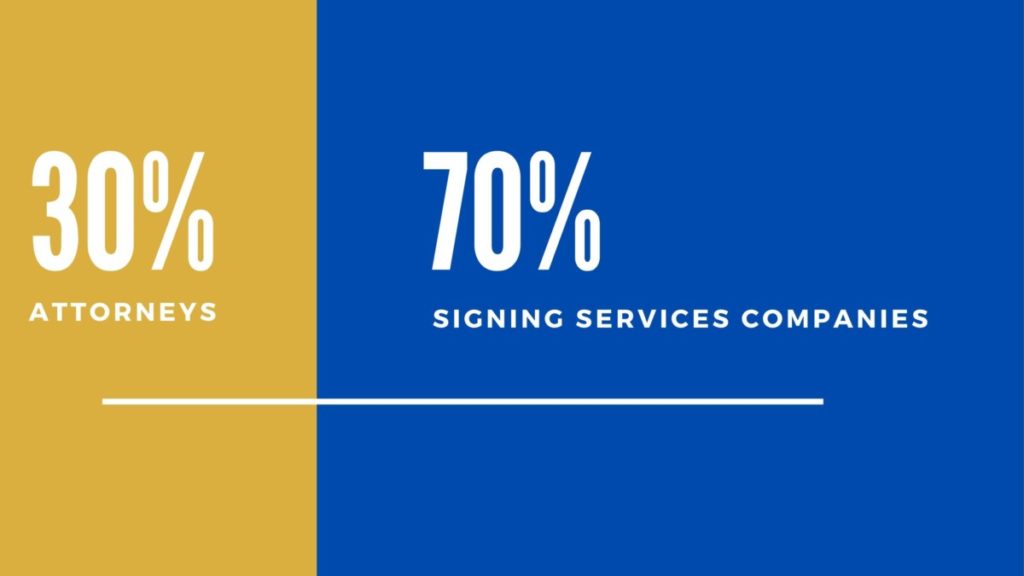(**) Disclosure: This post may contain affiliate links, meaning RealEstateCareerHQ.com will get a commission if you decide to make a purchase through the links, but at no additional cost to you.
In escrow states, third-party escrow companies handle the mortgage closings. In attorney states, attorneys coordinate the loan document signing process. But the specific tasks in which a closing attorney is required to take care vary across different states.
If you are planning to become a notary loan signing agent, you better know what kind of state you are located. Some have a concern that in an attorney state, attorneys tend to handle the closing documents in-house. This could be more challenge for notary loan signing agents in obtaining businesses.
To give you a better idea about how notary loan signing agents work in an attorney state, I have done some research. In this article, you will learn the differences between escrow states and attorney states. I will also share two case studies where loan signing agents had achieved great success despite servicing in an attorney state.
But before we start, I want to give a brief disclaimer. This post is not intended as legal advice or state/federal notary public training. It is for general information only. Please check with your state to be sure that loan signing agents are utilized in the closing process. Always follow your state’s notary laws and best practices.
Escrow States vs. Attorney States
This is a short 8 minutes video from “Real Estate Decoded.” It clearly explains the difference between escrow states and attorney states.
The ways that loan signing agents obtain signing business are different between escrow states and attorney states

In escrow states, escrow officers or title agents would be responsible for the real estate closing. They tend to hire a notary signing agents to handle the signing process of the loan documents.
The signing agents would meet with the loan borrower, confirm their identity, and ensure their signatures are on the required sections of the documents. Then they would place a notarized seal on the paperwork and submit them back to the escrow office.
On the other hand, in attorney states, the mortgage closing is coordinated by an attorney. But there could be variations across states as to what specific tasks an attorney needs to be responsible for. It really depends on individual state laws.
In many instances, the attorney offices already have in-house staff taking care of the signing process. So notary loan signing agents need to offer outstanding services in gaining direct business from them.
I have also heard that many loan signing agents in attorney states are heavily relying on signing services agency in bringing them closing appointments.
Later on, in this post, I’ll go over two case studies on how a notary loan signing agents obtain their businesses in an attorney state.
Can mortgage closing be done without an attorney in an attorney state?

In some attorney states, there could be an exemption where the signing does not need to go through an attorney. This is given when the subject property is located in an escrow state, while the signing occurs in an attorney state.
However, this might not apply to all attorney state as each state could have its own rules and restriction. Be sure to follow your state laws.
More about escrow states vs attorney states

According to the video, closing with escrow offices is generally more convenient for buyers and sellers. I guess because it is easier to coordinate appointments with a loan signing agent that represent an escrow office. But not so much with in-house staff at an attorney office.
Also, states in the North-East and South-East tend to be attorney states, while those in the Mid-West are generally escrow states.
Which States are Attorney Closing States?
| State | Attorney State (+) | Signing Agent State Restrictions (++) |
|---|---|---|
| Alabama | Yes - Attorney State | N/A |
| Alaska | No | N/A |
| Arizona | No | N/A |
| Arkansas | No | N/A |
| California | No | N/A |
| Colorado | No | N/A |
| Connecticut | Yes - Attorney State | Prohibits out of state attorneys and nonattorney Notaries from conducting closings for most mortgage loans in Connecticut. This excludes home equity lines of credit or other loans secured by real property that do not require the issuance of a title insurance policy. |
| Delaware | Yes - Attorney State | Requires an attorney admitted to the state bar to be present or involved in the closing of real property transactions. |
| District of Columbia | No | N/A |
| Florida | No | N/A |
| Georgia | Yes - Attorney State | Requires an attorney admitted to the state bar to be present or involved in the closing of real property transactions. |
| Hawaii | Yes - Attorney State | N/A |
| Idaho | No | N/A |
| Illinois | No | N/A |
| Indiana | No | Requires a title insurance license for all closings. |
| Iowa | Yes - Attorney State | N/A |
| Kansas | No | N/A |
| Kentucky | Yes - Attorney State | N/A |
| Louisiana | Yes - Attorney Must Examine Title | N/A |
| Maine | Yes - Attorney State | N/A |
| Maryland | Yes - Attorney State | Requires a title insurance license for all closings. |
| Massachusetts | Yes - Attorney State | Requires an attorney admitted to the state bar to be present or involved in the closing of real property transactions. A Notary who is employed by a lender may notarize a document in conjunction with the closing of his or her employer's real estate loans. |
| Michigan | No | N/A |
| Minnesota | No | Requires a closing agent license |
| Mississippi | Yes - Attorney State | N/A |
| Missouri | No | N/A |
| Montana | No | N/A |
| Nebraska | No | Limits the fees Notaries may charge (to the statutory maximum fees for notarial acts only). No ancillary fees, such as a courier fee, may be charged. |
| Nevada | No | Limits the fees Notaries may charge (to the statutory maximum). These fees include an hourly travel fee based upon the time of day traveled. |
| New Hampshire | Yes - Attorney State | N/A |
| New Jersey | Yes - North New Jersey | N/A |
| No - South New Jersey | N/A | |
| New Mexico | No | N/A |
| New York | Yes - Attorney State | Certain companies providing assignments to signing professionals may choose to only utilize licensed attorneys. |
| North Carolina | Yes - Attorney State | Limits the fees Notaries may charge (to the statutory maximum fees for notarial acts). No other ancillary fees may be charged |
| North Dakota | Yes - Attorney State | N/A |
| Ohio | No | N/A |
| Oklahoma | No | N/A |
| Oregon | No | N/A |
| Pennsylvania | No | N/A |
| Rhode Island | Yes - Attorney State | N/A |
| South Carolina | Yes - Attorney State | Requires an attorney admitted to the state bar to be present or involved in the closing of real property transactions. |
| South Dakota | No | Authorities conflict about whether Notary Signing Agents can conduct signings without being an attorney. |
| Tennessee | Yes - Attorney State | N/A |
| Texas | No | Home Equity Line of Credit (HELOC) loans are subject to Article XVI, Section 50 of the Texas Constitution and must be signed and closed in the office of a lender, attorney or title company. |
| Utah | No | N/A |
| Vermont | Yes - Attorney State | Requires an attorney admitted to the state bar to be present or involved in the closing of real property transactions. |
| Virginia | Yes - Attorney State | Restricts Notaries from conducting real property signings without an escrow license if they but once handle monies for closing costs |
| Washington | No | N/A |
| West Virginia | Yes - Attorney State | Requires an attorney admitted to the state bar to be present or involved in the closing of real property transactions. |
| Wisconsin | No | N/A |
| Wyoming | No | N/A |
Source: (+) First American Title- Your Guide to Real Estate Customs by State; (++) NNA Signing Agent State Restrictions
Note: These notices are based upon the best available information at the time of publication and are not intended as legal advice. The conditions described above are subject to change at any time due to legislative, executive or administrative decisions or developments. Therefore, please follow your state laws and notary best practices.
Case Study#1: A Responsible Wife Works Part-Time Hours as a Notary Signing Agent, while Earning $6,000/month in an Attorney State!
To help you better understand the potential in the loan signing business in an attorney state, I just watched an inspiring 25 minutes video. It is where Mark Wills, a top-notch notary coach, interviewed one of his students, Debra.
This is how her loan signing journey started
Debra is a notary loan signing agent in North Carolina. In the interview, she shared that her husband was sick. She was looking for part-time work, where she could spend more time taking care of him.
One day, she came across Mark Will’s podcast. She found this is an interesting opportunity, and gave it a try.
Debra obtained the notary commission and followed the steps taught in Mark’s training system. Within one year, she was able to achieve in making $6,000/month. The best is that she is only working part-time hours of around 24 to 30 hours/week.
Due to her huge success, she becomes the ambassador for the Loan Signing System (LSS) program for attorney states.
Would you like to learn how to make $75 to $200 per signing appointment? You must check out the Loan Signing System from Mark Wills. (**) This is one of the best training programs for loan signing agents. Many students have achieved remarkable business success after taking this program.
Obtain signing business from attorneys

This is a stock photo, and not a photo of Debra.
Despite locating in an attorney state, that did not stop Debra from growing her business. She took the time to build a trusted relationship with attorney offices. As a result, she was able to obtain direct signing businesses from them.
Although you might wonder why attorneys would outsource the signing process to Debra when they could do so in-house, she shared that there are occasions where signing at the attorney office is not a feasible choice for the mortgage borrower.
For example, the borrower cannot visit the attorney’s office during regular work hours, or they are located too far away. In such a situation, Debra’s mobile signing services becomes the ideal solution. She is willing to complete the signing on weekends, evenings, and even drive to the borrower’s place. This is something not a typical in-house staff would do.
She revealed that she would make around $90 – $150 per closing. But if she needs to drive further away, she would get about $200.
Attorney offices are not the only source of signing businesses

Debra revealed that signing works from attorney offices represent only 30% of her business, and the rest is from signing services companies. In the interview, Mark Wills also expressed that many notary signing agents in attorney states are getting most of their businesses from signing services agencies.
One thing I like about Debra is her relationship building tactics. Rather than spreading her time thin with 50 different signing services companies, she intentionally focuses on a few. This helped her to create a deeper relationship. So whenever those agencies are looking for signing agents, they would immediately think of Debra.
On a separate note, if you want to know more about being a notary signing agent on a part-time basis, here is an interview I had with Stephanie Espinal. She shared how she managed to start the loan signing business while keeping her daytime job.
Case Study#2: From Barely Making End Needs to $10,000/month as a Notary Signing Agent in an Attorney State!!
Here is another interview with Mark Will’s students. His name is Dylan and from Alabama, which is also an attorney state.
I like how honest and transparent he was during the interview. Dylan used to have another job in Alabama. But after working there for three months, he did not enjoy it and quitted the job.
To take care of his daily expenses, he took on different odd jobs, such as driving Uber, Door Dash. However, this was barely enough to cover his bills. I think he mentioned that he was behind rent payments somewhere in the clip, and the landlord is his friend.
So one day, while he was delivering seafood in between cities. During the 4.5 hours drive, he listened to one of Mark Will’s podcast. The idea of becoming a loan signing agent struck him. The profession sounded straightforward, and, of course, the potential of making a good income is attractive too.
Each career journey of a loan signing agent is different

This is just a stock photo, and not a photo of Dylan.
So he enrolled in the Loan Signing System (LSS) training program. From what I heard from the interview, it gives me a feeling that Dylan is a more methodical person. He didn’t rush to overnight success. Rather he spent the time really knowing the materials and preparing himself.
He spent a couple of months going through the LSS training, then got the notary commission certificate. Unlike most other success stories, he only made around $450 in the first four months. They were all from SnapDoc.
Being active brings more signing appointments

When Dylan reflected on his business practice, he could have signed up with more signing services companies. So after the first few months, he signed up with more signing agencies such as Amrock and Title 365.
He also became more active in approaching more signing services companies. He contacted them in explaining his value proposition. For instance, he can do signing properly, and that he has NNA Certification, took the LLS course.
Then business starts to grow from there gradually. His monthly earning starts to increase from $450, $1000, $1200, $2600, $3400, $3950, $4200, $7000, $9200 to five figures.
His persistence and hardworking led him to more and more signing opportunities. There were days where he would work from 8:00 am to 8:00 pm.
Within a year and a half, his monthly income has dramatically risen to $11,000. He completed about 5 to 6 signing per day in his peak month, which translated to 125 closings for the month.
If you want to succeed in the loan signing industry, you must check out this loan system training program. If you review the testimonials of his students, you’ll be amazed at how the notary career changes their life after they learned from Mark Wills. (**)
More about his loan signing journey
Dylan repeatedly said that the loan documents are not as complicated one might think. Also, no prior background in the mortgage and loan industry is fine.
I’m guessing that Dylan wasn’t confident enough at the beginning, which held him back from early success. But once he got through that barrier, he started having incredible progress as you could see.
I like how down to earth his advice is for other notary signing agents. It is to follow proper procedures for the signing process and always double-check your work.
Now, Dylan would get at least 3 to 4 notification a day of signing appointments. If I remember correctly, Amrock would also call him personally to notify him about work orders available. So Dylan is at the stage where he doesn’t need to worry about business volumes anymore.
An interesting story he shared is that he had come across the same signer. Dylan met the signer when he bought the house. Then the signer needed to refinance the property, where Dylan was the notary signing agent again coincidentally.
From this encounter, Dylan could see the great potential in the loan signing business. A signing agent is needed not only during a real estate closing but also for refinancing.
Final Words about Escrow States vs Attorney States
Admittedly, the demand for loan signing agents could be greater in escrow states than in attorney states. But as you could see in the two case studies, it is still possible to succeed in attorney states.
Of course, everyone’s situation could be different. You should check with your state whether loan signing agents are utilized in the closing process. Always follow your state laws and notary best practices.
But I genuinely believe that if you are persistent and willing to put in hard works, focus on building a long-term trusted relationship with business partners, and show them how your competitive edge could fulfill their needs, then success is only a matter of time.
If you are reading up to this point, I bet you must be interested in the notary signing profession. But why reinvent the wheel when there is a proven system that works? Many students had great success following the Loan Signing System (LSS) from Mark Wills. You may click here to check it out yourself. (**)
Disclaimer: The information in this post is for general information only, and not intend to provide any advice. They are subjected to change without any notice, and not guaranteed to be error-free. Make sure you comply with the state laws and regulatory rules.
(**) Affiliate Disclosure: Please note that some of the links above are affiliate links, and at no additional cost to you. Our company, JCHQ Publishing will earn a commission if you decide to make a purchase after clicking on the link. Please understand that we include them based on our experience or the research on these companies or products, and we recommend them because they are helpful and useful, not because of the small commissions we make if you decide to buy something through the links. Please do not spend any money on these products unless you feel you need them or that they will help you achieve your goals.
Reference:

